上一章我们已经将maven集成在eclipse中,并且已经配置nexus搭建的私服为maven的仓库。
这一章我们将在eclipse里利用maven建立一个ssh项目。
1、在eclipse中新建一个Dynamic Web Project。如果出现该报错信息,请检查你的tomcat是否有安装,并且是否有配置到eclispe里。

解决办法是,可以直接从界面上找到New Runtime按钮

在弹出的窗口中选择你要添加的服务器类型,笔者这里是选得tomcat6.0
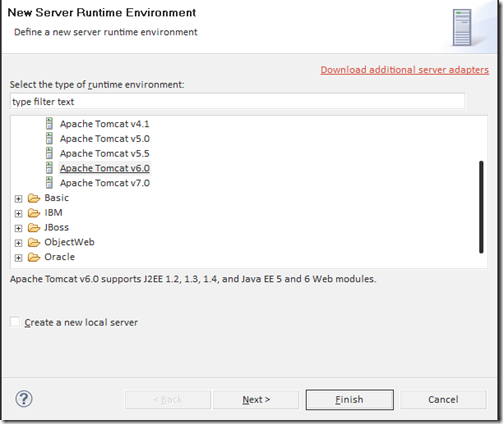
然后下一步,会弹出一个新窗口
Name代表服务器的名字
Tomcate installation directory代表tomcat的安装路径
JRE代表你的java环境,Finish
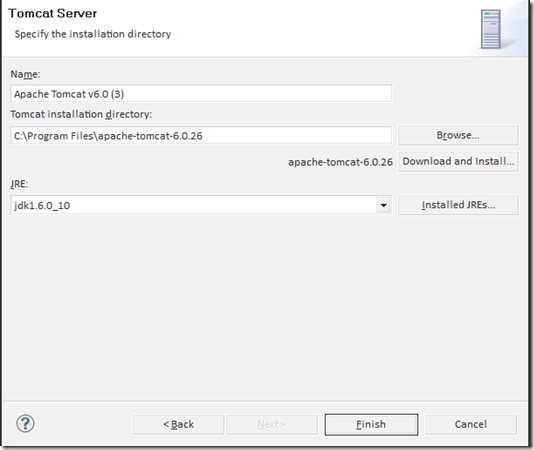
然后会回到Dynamic Web Project窗口,点击Next,设置项目bulid时(也就是maven install时)的输出路径为target

点击Next,设置Content directory路径为src/main/webapp,然后Finish。这样一个动态web项目就创建好了。

然后设置Java Resources的路径,在左边的项目视图里找到我们刚刚创建的项目,右键->properties,在弹出的窗口里面点击Java Build Path,然后再点击Add Folder…

在main路径下面创建java文件夹,并勾选。
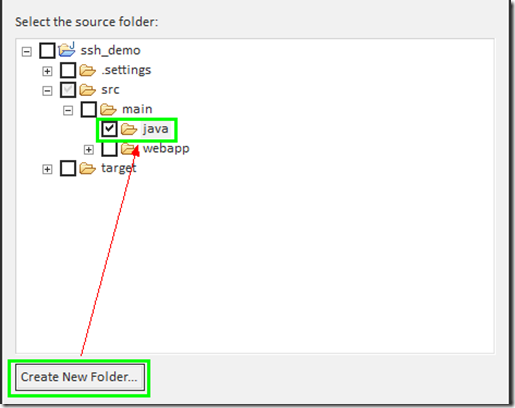
点击ok后,回到刚刚的界面,我会发现,有报错信息。这个时候删除最先的文件夹即可,如图:
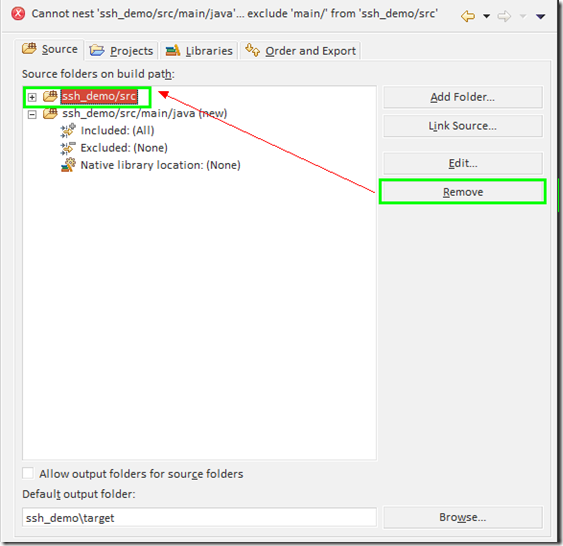
然后点击ok,这个时候再次对项目点击右键->Maven->Enable Dependency Management
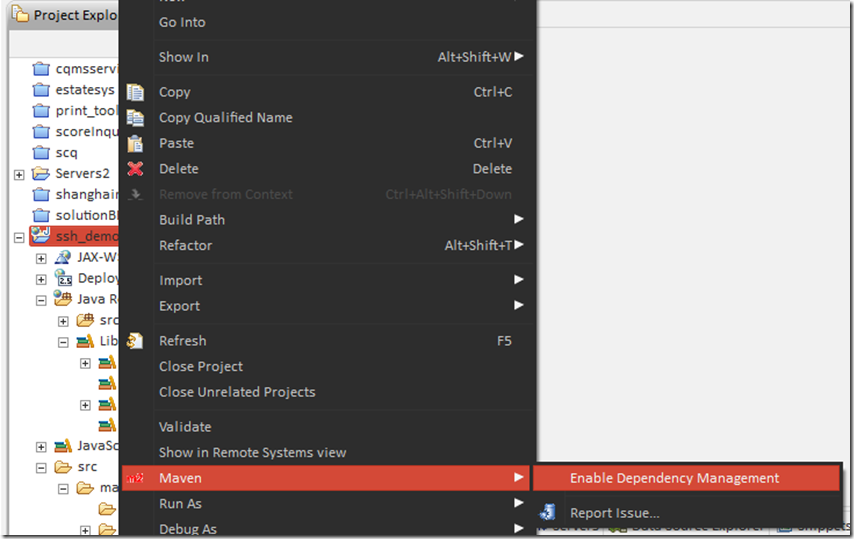
在弹出的窗口中将Packaging设置成war,然后Finish。

这个时候如果项目报错Java compiler level does not match the version of the installed Java project facet
请按照该贴方法解决:http://cai555.iteye.com/blog/468409
然后就是引入依赖的jar包了。具体在maven中怎么添加jar包,这里就不阐述了,大家可以google一下,非常简单。这里我直接提供pom.xml的内容


setting.xml<project xmlns="http://maven.apache.org/POM/4.0.0" xmlns:xsi="http://www.w3.org/2001/XMLSchema-instance" xsi:schemaLocation="http://maven.apache.org/POM/4.0.0 http://maven.apache.org/xsd/maven-4.0.0.xsd">
<modelVersion>4.0.0</modelVersion>
<groupId>ssh_demo</groupId>
<artifactId>ssh_demo</artifactId>
<version>0.0.1-SNAPSHOT</version>
<packaging>war</packaging>
<build>
<plugins>
<!-- require at least JDK 1.6 to run the build -->
<plugin>
<groupId>org.apache.maven.plugins</groupId>
<artifactId>maven-enforcer-plugin</artifactId>
<executions>
<execution>
<id>enforce-java</id>
<goals>
<goal>enforce</goal>
</goals>
<configuration>
<rules>
<requireJavaVersion>
<version>[1.6,)</version>
</requireJavaVersion>
</rules>
</configuration>
</execution>
</executions>
</plugin>
<!-- by default, compile to JDK 1.6 compatibility (individual modules
and/or user can override) -->
<plugin>
<groupId>org.apache.maven.plugins</groupId>
<artifactId>maven-compiler-plugin</artifactId>
<configuration>
<source>1.6</source>
<target>1.6</target>
<encoding>UTF-8</encoding>
</configuration>
</plugin>
<!-- Test plugin -->
<plugin>
<groupId>org.apache.maven.plugins</groupId>
<artifactId>maven-surefire-plugin</artifactId>
<configuration>
<testFailureIgnore>true</testFailureIgnore>
<!--<skip>true</skip> -->
</configuration>
</plugin>
<!-- war plugin -->
<plugin>
<groupId>org.apache.maven.plugins</groupId>
<artifactId>maven-war-plugin</artifactId>
<version>2.0.2</version>
<configuration>
<!-- <webResources> <webResource> <directory> ${basedir}/src/main/webapp/WEB-INF
</directory> <excludes> <exclude>**/content</exclude> </excludes> </webResource>
</webResources> -->
<webResource>
<directory>
${basedir}/src/main/webapp/WEB-INF
</directory>
<!-- <excludes> <exclude>**/content</exclude> </excludes> -->
<includes>
<include>**/*.xml</include>
</includes>
<targetPath>WEB-INF</targetPath>
</webResource>
<archive>
<manifest>
<addClasspath>true</addClasspath>
</manifest>
</archive>
</configuration>
</plugin>
</plugins>
</build>
<dependencies>
<dependency>
<groupId>org.springframework</groupId>
<artifactId>spring-jdbc</artifactId>
<version>3.0.3.RELEASE</version>
</dependency>
<dependency>
<groupId>org.apache.struts</groupId>
<artifactId>struts2-convention-plugin</artifactId>
<version>2.2.1</version>
<type>jar</type>
<scope>compile</scope>
<exclusions>
<exclusion>
<artifactId>tools</artifactId>
<groupId>com.sun</groupId>
</exclusion>
</exclusions>
</dependency>
<dependency>
<groupId>org.springframework</groupId>
<artifactId>spring-web</artifactId>
<version>3.0.3.RELEASE</version>
<type>jar</type>
<scope>compile</scope>
</dependency>
<dependency>
<groupId>org.springframework</groupId>
<artifactId>spring-orm</artifactId>
<version>3.0.3.RELEASE</version>
<type>jar</type>
<scope>compile</scope>
</dependency>
<dependency>
<groupId>org.aspectj</groupId>
<artifactId>aspectjweaver</artifactId>
<version>1.6.9</version>
<type>jar</type>
<scope>compile</scope>
</dependency>
<dependency>
<groupId>com.jolbox</groupId>
<artifactId>bonecp</artifactId>
<version>0.6.7.2</version>
<type>jar</type>
<scope>compile</scope>
</dependency>
<dependency>
<groupId>org.slf4j</groupId>
<artifactId>slf4j-api</artifactId>
<version>1.6.1</version>
<type>jar</type>
<scope>compile</scope>
</dependency>
<dependency>
<groupId>org.slf4j</groupId>
<artifactId>slf4j-log4j12</artifactId>
<version>1.6.1</version>
<type>jar</type>
<scope>compile</scope>
</dependency>
<dependency>
<groupId>mysql</groupId>
<artifactId>mysql-connector-java</artifactId>
<version>5.1.13</version>
<type>jar</type>
<scope>compile</scope>
</dependency>
<dependency>
<groupId>org.hibernate</groupId>
<artifactId>hibernate-annotations</artifactId>
<version>3.6.0-SNAPSHOT</version>
<type>jar</type>
<scope>compile</scope>
</dependency>
<dependency>
<groupId>opensymphony</groupId>
<artifactId>sitemesh</artifactId>
<version>2.4.2</version>
<type>jar</type>
<scope>compile</scope>
</dependency>
<dependency>
<groupId>org.apache.struts</groupId>
<artifactId>struts2-sitemesh-plugin</artifactId>
<version>2.2.1</version>
<type>jar</type>
<scope>compile</scope>
</dependency>
<dependency>
<groupId>jexcelapi</groupId>
<artifactId>jxl</artifactId>
<version>2.6</version>
<scope>compile</scope>
</dependency>
<dependency>
<groupId>org.springframework</groupId>
<artifactId>spring-test</artifactId>
<version>3.0.3.RELEASE</version>
<type>jar</type>
</dependency>
<dependency>
<groupId>junit</groupId>
<artifactId>junit</artifactId>
<version>4.8.1</version>
<type>jar</type>
</dependency>
<dependency>
<groupId>org.apache.struts</groupId>
<artifactId>struts2-spring-plugin</artifactId>
<version>2.2.1</version>
<type>jar</type>
<scope>compile</scope>
</dependency>
<dependency>
<groupId>org.javassist</groupId>
<artifactId>javassist</artifactId>
<version>3.13.0-GA</version>
<type>jar</type>
<scope>compile</scope>
</dependency>
<dependency>
<groupId>joda-time</groupId>
<artifactId>joda-time</artifactId>
<version>1.6</version>
</dependency>
<dependency>
<groupId>org.hibernate</groupId>
<artifactId>hibernate-validator</artifactId>
<version>4.1.0.Beta1</version>
<type>jar</type>
<scope>compile</scope>
</dependency>
<dependency>
<groupId>commons-configuration</groupId>
<artifactId>commons-configuration</artifactId>
<version>1.6</version>
</dependency>
<dependency>
<groupId>dom4j</groupId>
<artifactId>dom4j</artifactId>
<version>1.6.1</version>
<type>jar</type>
<scope>compile</scope>
</dependency>
<dependency>
<groupId>org.apache.struts</groupId>
<artifactId>struts2-json-plugin</artifactId>
<version>2.1.8.1</version>
</dependency>
<dependency>
<groupId>net.sf.json-lib</groupId>
<artifactId>json-lib</artifactId>
<version>2.2.3</version>
<type>jar</type>
<scope>compile</scope>
</dependency>
<dependency>
<groupId>jaxen</groupId>
<artifactId>jaxen</artifactId>
<version>1.1.3</version>
</dependency>
</dependencies>
</project>
配置完pom文件后,maven就会自动去从服务器上面下载需要的jar包了,考虑到国内操蛋的网络环境,笔者在这里提供自己的中央仓,里面的jar包都已经基本完善,常用的基本都在。
下载地址:(m2.7z)http://115.com/file/e7xggyua#
最后的效果如图:
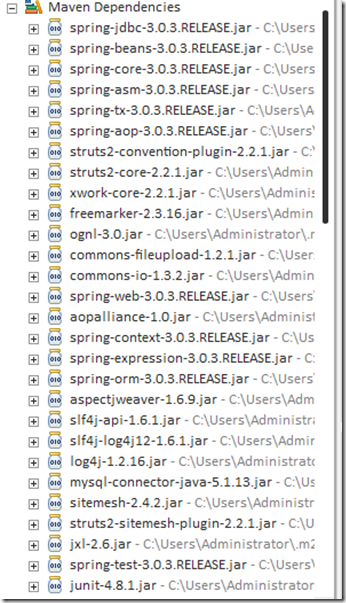
配置完jar包后,现在开始配置各种所需要的配置文件。但在这之前,我们先把必须的包建立好,请按下图依次建立好这些包
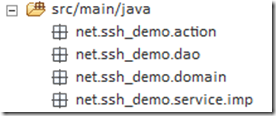
从上到下他们分别是存放action的包,dao的包,域对象(持久对象)的包,service的包.
然后下面开始配置各种配置文件。
首先是WEB-INF/web.xml


web.xml<?xml version="1.0" encoding="UTF-8"?>
<web-app xmlns:xsi="http://www.w3.org/2001/XMLSchema-instance" xmlns="http://java.sun.com/xml/ns/javaee" xmlns:jsp="http://java.sun.com/xml/ns/javaee/jsp" xmlns:web="http://java.sun.com/xml/ns/javaee/web-app_2_5.xsd" xsi:schemaLocation="http://java.sun.com/xml/ns/javaee http://java.sun.com/xml/ns/javaee/web-app_2_5.xsd" id="WebApp_ID" version="2.5">
<display-name>ssh_demo</display-name>
<listener><!-- 配置struts监听器 -->
<listener-class>org.springframework.web.context.ContextLoaderListener</listener-class>
</listener>
<filter>
<filter-name>struts-prepare</filter-name>
<filter-class>org.apache.struts2.dispatcher.ng.filter.StrutsPrepareFilter</filter-class>
<init-param>
<param-name>actionPackages</param-name>
<param-value>net.ssh_demo.action</param-value><!-- 配置action路径 -->
</init-param>
</filter>
<filter>
<filter-name>struts-execute</filter-name>
<filter-class>org.apache.struts2.dispatcher.ng.filter.StrutsExecuteFilter</filter-class>
</filter>
<filter-mapping>
<filter-name>struts-prepare</filter-name>
<url-pattern>/*</url-pattern>
</filter-mapping>
<filter-mapping>
<filter-name>struts-execute</filter-name>
<url-pattern>/*</url-pattern>
</filter-mapping>
<welcome-file-list>
<welcome-file>/index/index.jsp</welcome-file>
</welcome-file-list>
<error-page>
<error-code>404</error-code>
<location>/pages/comm/error_404.jsp</location>
</error-page>
<error-page>
<error-code>500</error-code>
<location>/500error.jsp</location>
</error-page>
<jsp-config>
<jsp-property-group>
<description>
Special property group for JSP Configuration JSP example.
</description>
<display-name>JSPConfiguration</display-name>
<url-pattern>*.html</url-pattern>
<el-ignored>true</el-ignored>
<page-encoding>UTF-8</page-encoding>
<scripting-invalid>false</scripting-invalid>
<include-prelude></include-prelude>
<include-coda></include-coda>
</jsp-property-group>
</jsp-config>
</web-app>
然后是WEB-INF/applicationContext.xml


applicationContext.xml<?xml version="1.0" encoding="UTF-8"?>
<beans xmlns="http://www.springframework.org/schema/beans"
xmlns:context="http://www.springframework.org/schema/context"
xmlns:xsi="http://www.w3.org/2001/XMLSchema-instance" xmlns:aop="http://www.springframework.org/schema/aop"
xmlns:tx="http://www.springframework.org/schema/tx"
xsi:schemaLocation="
http://www.springframework.org/schema/beans
http://www.springframework.org/schema/beans/spring-beans-3.0.xsd
http://www.springframework.org/schema/context
http://www.springframework.org/schema/context/spring-context-3.0.xsd
http://www.springframework.org/schema/tx
http://www.springframework.org/schema/tx/spring-tx-3.0.xsd
http://www.springframework.org/schema/aop
http://www.springframework.org/schema/aop/spring-aop-3.0.xsd">
<!-- 项目路径 -->
<context:component-scan base-package="net.ssh_demo" />
<!-- 数据库相关配置 -->
<bean id="mainDataSource" class="com.jolbox.bonecp.BoneCPDataSource"
destroy-method="close">
<property name="driverClass" value="com.mysql.jdbc.Driver" />
<property name="jdbcUrl"
value="jdbc:mysql://127.0.0.1/test?useUnicode=true&characterEncoding=UTF-8&autoReconnect=true&failOverReadOnly=false" />
<property name="username" value="root" />
<property name="password" value="root" />
<property name="idleConnectionTestPeriod" value="60" />
<property name="idleMaxAge" value="240" />
<property name="maxConnectionsPerPartition" value="30" />
<property name="minConnectionsPerPartition" value="10" />
<property name="partitionCount" value="3" />
<property name="acquireIncrement" value="5" />
<property name="statementsCacheSize" value="100" />
<property name="releaseHelperThreads" value="3" />
</bean>
<bean id="dataSource"
class="org.springframework.jdbc.datasource.LazyConnectionDataSourceProxy">
<property name="targetDataSource">
<ref local="mainDataSource" />
</property>
</bean>
<bean id="sessionFactory"
class="org.springframework.orm.hibernate3.annotation.AnnotationSessionFactoryBean">
<property name="dataSource">
<ref bean="dataSource" />
</property>
<property name="hibernateProperties">
<props>
<prop key="hibernate.dialect">org.hibernate.dialect.MySQLDialect</prop>
<prop key="hibernate.show_sql">true</prop>
<prop key="hibernate.format_sql">true</prop>
<prop key="hibernate.use_sql_comments">true</prop>
<prop key="hibernate.jdbc.batch_size">20</prop>
<!--<prop key="hibernate.hbm2ddl.auto">create</prop> -->
<prop key="hibernate.hbm2ddl.auto">update</prop>
</props>
</property>
<property name="packagesToScan" value="net.ssh_demo.domain" />
</bean>
<bean id="transactionManager"
class="org.springframework.orm.hibernate3.HibernateTransactionManager">
<property name="sessionFactory">
<ref local="sessionFactory" />
</property>
</bean>
<!-- aop事务配置 -->
<aop:config>
<aop:pointcut id="productServiceMethods"
expression="execution(* net.ssh_demo.service.imp.*.*(..))" />
<aop:advisor advice-ref="txAdvice" pointcut-ref="productServiceMethods" />
</aop:config>
<tx:advice id="txAdvice" transaction-manager="transactionManager">
<tx:attributes>
<tx:method name="save*" propagation="REQUIRED" read-only="false" />
<tx:method name="regist*" propagation="REQUIRED" read-only="false" />
<tx:method name="import*" propagation="REQUIRED" read-only="false" />
<tx:method name="insert*" propagation="REQUIRED" read-only="false" />
<tx:method name="delete*" propagation="REQUIRED" read-only="false" />
<tx:method name="update*" propagation="REQUIRED" read-only="false" />
<tx:method name="edit*" propagation="REQUIRED" read-only="false" />
<tx:method name="remove*" propagation="REQUIRED" read-only="false" />
<tx:method name="add*" propagation="REQUIRED" read-only="false" />
<tx:method name="create*" propagation="REQUIRED" read-only="false" />
<tx:method name="pulish*" propagation="REQUIRED" read-only="false" />
<tx:method name="list*" propagation="SUPPORTS" read-only="true" />
<tx:method name="get*" propagation="SUPPORTS" read-only="true" />
<tx:method name="query*" propagation="SUPPORTS" read-only="true" />
<tx:method name="find*" propagation="SUPPORTS" read-only="true" />
<tx:method name="execute*" propagation="REQUIRED"
read-only="false" />
<tx:method name="batch*" propagation="REQUIRED" read-only="false" />
<tx:method name="generate*" propagation="REQUIRED"
read-only="false" />
<tx:method name="*" propagation="SUPPORTS" read-only="true" />
</tx:attributes>
</tx:advice>
<!-- 配置文件 -->
<bean id="propertiesConfiguration"
class="org.apache.commons.configuration.PropertiesConfiguration">
<constructor-arg>
<value>config.properties</value>
</constructor-arg>
</bean>
</beans>
然后是在src目录下面的数个文件:


struts.properties#log4j.rootCategory=ERROR,stdout,file
log4j.rootLogger=ERROR,stdout,file
log4j.appender.stdout=org.apache.log4j.ConsoleAppender
log4j.appender.stdout.layout=org.apache.log4j.PatternLayout
log4j.appender.stdout.layout.ConversionPattern=%d{ABSOLUTE} %5p %t %c{2}:%L - %m%n
log4j.category.org.springframework.beans.factory=ERROR
log4j.category.com.jolbox=ERROR,Console
# Stdout
log4j.appender.Console=org.apache.log4j.ConsoleAppender
log4j.appender.Console.layout=org.apache.log4j.PatternLayout
log4j.appender.Console.layout.ConversionPattern=[%t] %-5p %c %x - %m%n
# file
log4j.appender.file=org.apache.log4j.FileAppender
log4j.appender.file.File=d:\\log.log
log4j.appender.file.layout=org.apache.log4j.PatternLayout
log4j.appender.file.MaxFileSize=2048KB
log4j.appender.file.layout.ConversionPattern=%-d{yyyy-MM-dd HH:mm:ss,SSS} [%c]-[%p] %m%n
log4j.appender.file.Threshold = ERROR


log4j.properties#
# $Id: default.properties 789467 2009-06-29 22:11:12Z musachy $
#
# Licensed to the Apache Software Foundation (ASF) under one
# or more contributor license agreements. See the NOTICE file
# distributed with this work for additional information
# regarding copyright ownership. The ASF licenses this file
# to you under the Apache License, Version 2.0 (the
# "License"); you may not use this file except in compliance
# with the License. You may obtain a copy of the License at
#
# http://www.apache.org/licenses/LICENSE-2.0
#
# Unless required by applicable law or agreed to in writing,
# software distributed under the License is distributed on an
# "AS IS" BASIS, WITHOUT WARRANTIES OR CONDITIONS OF ANY
# KIND, either express or implied. See the License for the
# specific language governing permissions and limitations
# under the License.
#
### START SNIPPET: complete_file
### Struts default properties
###(can be overridden by a struts.properties file in the root of the classpath)
###
### Specifies the Configuration used to configure Struts
### one could extend org.apache.struts2.config.Configuration
### to build one's customize way of getting the configurations parameters into Struts
# struts.configuration=org.apache.struts2.config.DefaultConfiguration
### This can be used to set your default locale and encoding scheme
# struts.locale=en_US
struts.i18n.encoding=UTF-8
### if specified, the default object factory can be overridden here
### Note: short-hand notation is supported in some cases, such as "spring"
### Alternatively, you can provide a com.opensymphony.xwork2.ObjectFactory subclass name here
# struts.objectFactory = spring
### specifies the autoWiring logic when using the SpringObjectFactory.
### valid values are: name, type, auto, and constructor (name is the default)
struts.objectFactory.spring.autoWire = name
### indicates to the struts-spring integration if Class instances should be cached
### this should, until a future Spring release makes it possible, be left as true
### unless you know exactly what you are doing!
### valid values are: true, false (true is the default)
struts.objectFactory.spring.useClassCache = true
### ensures the autowire strategy is always respected.
### valid values are: true, false (false is the default)
struts.objectFactory.spring.autoWire.alwaysRespect = false
### if specified, the default object type determiner can be overridden here
### Note: short-hand notation is supported in some cases, such as "tiger" or "notiger"
### Alternatively, you can provide a com.opensymphony.xwork2.util.ObjectTypeDeterminer implementation name here
### Note: By default, com.opensymphony.xwork2.util.DefaultObjectTypeDeterminer is used which handles type detection
### using generics. com.opensymphony.xwork2.util.GenericsObjectTypeDeterminer was deprecated since XWork 2, it's
### functions are integrated in DefaultObjectTypeDeterminer now.
### To disable tiger support use the "notiger" property value here.
#struts.objectTypeDeterminer = tiger
#struts.objectTypeDeterminer = notiger
### Parser to handle HTTP POST requests, encoded using the MIME-type multipart/form-data
# struts.multipart.parser=cos
# struts.multipart.parser=pell
struts.multipart.parser=jakarta
# uses javax.servlet.context.tempdir by default
struts.multipart.saveDir=
struts.multipart.maxSize=20971520
### Load custom property files (does not override struts.properties!)
# struts.custom.properties=application,org/apache/struts2/extension/custom
### How request URLs are mapped to and from actions
#struts.mapper.class=org.apache.struts2.dispatcher.mapper.DefaultActionMapper
### Used by the DefaultActionMapper
### You may provide a comma separated list, e.g. struts.action.extension=action,jnlp,do
### The blank extension allows you to match directory listings as well as pure action names
### without interfering with static resources.
struts.action.extension=action,,
### Used by FilterDispatcher
### If true then Struts serves static content from inside its jar.
### If false then the static content must be available at <context_path>/struts
struts.serve.static=true
### Used by FilterDispatcher
### This is good for development where one wants changes to the static content be
### fetch on each request.
### NOTE: This will only have effect if struts.serve.static=true
### If true -> Struts will write out header for static contents such that they will
### be cached by web browsers (using Date, Cache-Content, Pragma, Expires)
### headers).
### If false -> Struts will write out header for static contents such that they are
### NOT to be cached by web browser (using Cache-Content, Pragma, Expires
### headers)
struts.serve.static.browserCache=true
### Set this to false if you wish to disable implicit dynamic method invocation
### via the URL request. This includes URLs like foo!bar.action, as well as params
### like method:bar (but not action:foo).
### An alternative to implicit dynamic method invocation is to use wildcard
### mappings, such as <action name="*/*" method="{2}" class="actions.{1}">
struts.enable.DynamicMethodInvocation = true
### Set this to true if you wish to allow slashes in your action names. If false,
### Actions names cannot have slashes, and will be accessible via any directory
### prefix. This is the traditional behavior expected of WebWork applications.
### Setting to true is useful when you want to use wildcards and store values
### in the URL, to be extracted by wildcard patterns, such as
### <action name="*/*" method="{2}" class="actions.{1}"> to match "/foo/edit" or
### "/foo/save".
struts.enable.SlashesInActionNames = false
### use alternative syntax that requires %{} in most places
### to evaluate expressions for String attributes for tags
struts.tag.altSyntax=true
### when set to true, Struts will act much more friendly for developers. This
### includes:
### - struts.i18n.reload = true
### - struts.configuration.xml.reload = true
### - raising various debug or ignorable problems to errors
### For example: normally a request to foo.action?someUnknownField=true should
### be ignored (given that any value can come from the web and it
### should not be trusted). However, during development, it may be
### useful to know when these errors are happening and be told of
### them right away.
struts.devMode = false
### when set to true, resource bundles will be reloaded on _every_ request.
### this is good during development, but should never be used in production
struts.i18n.reload=false
### Standard UI theme
### Change this to reflect which path should be used for JSP control tag templates by default
struts.ui.theme=xhtml
struts.ui.templateDir=template
#sets the default template type. Either ftl, vm, or jsp
struts.ui.templateSuffix=ftl
### Configuration reloading
### This will cause the configuration to reload struts.xml when it is changed
struts.configuration.xml.reload=false
### Location of velocity.properties file. defaults to velocity.properties
struts.velocity.configfile = velocity.properties
### Comma separated list of VelocityContext classnames to chain to the StrutsVelocityContext
struts.velocity.contexts =
### Location of the velocity toolbox
struts.velocity.toolboxlocation=
### used to build URLs, such as the UrlTag
struts.url.http.port = 80
struts.url.https.port = 443
### possible values are: none, get or all
struts.url.includeParams = none
### Load custom default resource bundles
# struts.custom.i18n.resources=testmessages,testmessages2
### workaround for some app servers that don't handle HttpServletRequest.getParameterMap()
### often used for WebLogic, Orion, and OC4J
struts.dispatcher.parametersWorkaround = false
### configure the Freemarker Manager class to be used
### Allows user to plug-in customised Freemarker Manager if necessary
### MUST extends off org.apache.struts2.views.freemarker.FreemarkerManager
#struts.freemarker.manager.classname=org.apache.struts2.views.freemarker.FreemarkerManager
### Enables caching of FreeMarker templates
### Has the same effect as copying the templates under WEB_APP/templates
struts.freemarker.templatesCache=false
### Enables caching of models on the BeanWrapper
struts.freemarker.beanwrapperCache=false
### See the StrutsBeanWrapper javadocs for more information
struts.freemarker.wrapper.altMap=true
### maxStrongSize for MruCacheStorage for freemarker
struts.freemarker.mru.max.strong.size=100
### configure the XSLTResult class to use stylesheet caching.
### Set to true for developers and false for production.
struts.xslt.nocache=false
### Whether to always select the namespace to be everything before the last slash or not
struts.mapper.alwaysSelectFullNamespace=false
### Whether to allow static method access in OGNL expressions or not
struts.ognl.allowStaticMethodAccess=true
### Whether to throw a RuntimeException when a property is not found
### in an expression, or when the expression evaluation fails
struts.el.throwExceptionOnFailure=false
### Logs as Warnings properties that are not found (very verbose)
struts.ognl.logMissingProperties=false
### Caches parsed OGNL expressions, but can lead to memory leaks
### if the application generates a lot of different expressions
struts.ognl.enableExpressionCache=true
### END SNIPPET: complete_file


struts.xml<?xml version="1.0" encoding="UTF-8"?>
<!DOCTYPE struts PUBLIC
"-//Apache Software Foundation//DTD Struts Configuration 2.1.7//EN"
"http://struts.apache.org/dtds/struts-2.1.7.dtd">
<struts>
<package name="dexopen" extends="struts-default">
<global-results>
<result name="input" >/pages/admin/error.jsp</result>
<result name="error" >/pages/admin/error.jsp</result>
<result name="notLogin">/pages/admin/forword.jsp</result>
</global-results>
<global-exception-mappings>
<exception-mapping result="error" exception="java.lang.Exception"></exception-mapping>
</global-exception-mappings>
</package>
<!-- action命名空间对应jsp的默认路径配置 -->
<constant name="struts.convention.result.path" value="/WEB-INF/pages"/>
<constant name="struts.convention.default.parent.package" value="dexopen"/>
</struts>
好了,至此为止整个项目已经配置完毕,目录结构应该如下所示
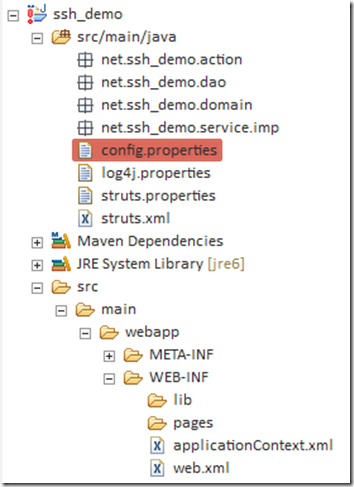
现在可以开始进行测试的工作了。
然后我们在eclipse里面直接通过tomcat运行的话,会报找不到类的错误,这是因为在eclipse里面直接运行的时候,依赖的jar包没有跟随项目一同发布,杯具的是笔者至今不知道该怎么解决,望大大支招,不过笔者有另外的办法。
在项目上右键->Run->Maven install…直到控制台输出下面的信息后,就说明项目打包成功了
[INFO] BUILD SUCCESS
[INFO] ------------------------------------------------------------------------
[INFO] Total time: 2:07.687s
[INFO] Finished at: Sun May 20 17:43:37 CST 2012
[INFO] Final Memory: 6M/13M
[INFO] ------------------------------------------------------------------------
对项目进行刷新操作,然后可以看到target里面已经有相应的内容了,我们把WEB-INF/lib目录覆盖到
你的工作空间\.metadata\.plugins\org.eclipse.wst.server.core\tmp0\wtpwebapps\ssh_demo\WEB-INF
再次运行之后就没问题了。tomcat输出信息如下
2012-5-20 18:09:31 org.apache.catalina.core.AprLifecycleListener init
信息: The APR based Apache Tomcat Native library which allows optimal performance in production environments was not found on the java.library.path: C:\Program Files\Java\jre6\bin;.;C:\Windows\Sun\Java\bin;C:\Windows\system32;C:\Windows;C:\Program Files\Common Files\Microsoft Shared\Windows Live;C:\Windows\system32;C:\Windows;C:\Windows\System32\Wbem;C:\Windows\System32\WindowsPowerShell\v1.0\;C:\Program Files\ATI Technologies\ATI.ACE\Core-Static;C:\Program Files\Java\jdk1.6.0_10\bin;C:\Program Files\Windows Live\Shared
2012-5-20 18:09:31 org.apache.tomcat.util.digester.SetPropertiesRule begin
警告: [SetPropertiesRule]{Server/Service/Engine/Host/Context} Setting property 'source' to 'org.eclipse.jst.jee.server:ssh_demo' did not find a matching property.
2012-5-20 18:09:31 org.apache.coyote.http11.Http11Protocol init
信息: Initializing Coyote HTTP/1.1 on http-8080
2012-5-20 18:09:31 org.apache.catalina.startup.Catalina load
信息: Initialization processed in 433 ms
2012-5-20 18:09:31 org.apache.catalina.core.StandardService start
信息: Starting service Catalina
2012-5-20 18:09:31 org.apache.catalina.core.StandardEngine start
信息: Starting Servlet Engine: Apache Tomcat/6.0.26
log4j:WARN No such property [maxFileSize] in org.apache.log4j.FileAppender.
2012-5-20 18:09:32 org.apache.catalina.core.ApplicationContext log
信息: Initializing Spring root WebApplicationContext
2012-5-20 18:09:36 org.apache.coyote.http11.Http11Protocol start
信息: Starting Coyote HTTP/1.1 on http-8080
2012-5-20 18:09:36 org.apache.jk.common.ChannelSocket init
信息: JK: ajp13 listening on /0.0.0.0:8009
2012-5-20 18:09:36 org.apache.jk.server.JkMain start
信息: Jk running ID=0 time=0/41 config=null
2012-5-20 18:09:36 org.apache.catalina.startup.Catalina start
信息: Server startup in 5061 ms
好了,至此为止从搭建maven私服到集成eclipse到通过maven集成ssh项目,整个系列全部完成(卧槽,尼玛终于写完了)。
这里提供项目的源文件下载:http://115.com/file/anromexp#














